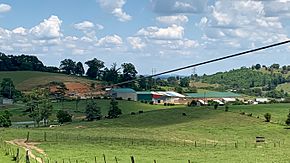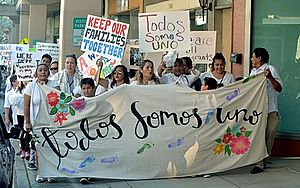2018 Southeastern Provisions raid facts for kids

Southeastern Provisions facility in June 2021
|
|
| Date | April 5, 2018 |
|---|---|
| Time | c. 9:00 a.m. (EDT) |
| Venue | Southeastern Provisions LLC slaughterhouse and meatpacking facility |
| Location | 1617 Helton Road, Bean Station, Tennessee, United States |
| Also known as | Bean Station ICE raid |
| Type | Workplace raid |
| Cause | Investigation into workplace violations, tax evasion |
| Target | James Brantley and undocumented workers |
| Participants |
|
| Arrests | 12 |
| Suspects | 86 |
| Charges | Conspiracy to harbor illegal immigrants, wire fraud, tax evasion, violating federal labor and environmental laws |
The 2018 Southeastern Provisions raid was a big operation that happened at Southeastern Provisions. This was a place where cattle were processed for meat in Grainger County, Tennessee. It was about 9 miles west of Bean Station.
During the raid, agents from U.S. Immigration and Customs Enforcement (ICE), the Internal Revenue Service (IRS), and the Tennessee Highway Patrol (THP) were involved. They arrested 11 workers and held 86 others. These workers were thought to be living in the United States without proper documents. This event is still one of the biggest workplace raids in U.S. history.
Contents
Why the Investigation Started
Southeastern Provisions was a facility that processed cattle. James Brantley owned it since 1988. It was a major employer in Grainger County.
Money Concerns
The IRS started looking into the plant a year before the raid. They heard that Brantley was taking out $100,000 in cash every week. He used this money to pay his workers. Reports suggested that Brantley hired about 150 workers who did not have proper work papers. He did this to save money on business costs.
Worker Safety
In May 2017, federal agents began investigating the plant. This was part of a new government policy to check businesses that hired workers without proper documents. An agent worked undercover at the facility. This person was hired without needing documents and was paid in cash. The agent saw difficult working conditions. Workers handled dangerous materials without safety gear. One worker even lost fingers while using a saw.
Environmental Issues
A month before the raid, the plant's system for treating waste broke down. This caused waste, including animal fluids, to spread into the nearby groundwater. The Tennessee Department of Environment and Conservation (TDEC) fined Southeastern Provisions $12,000. They said the plant needed a new waste treatment system.
A TDEC investigation found dangerous bacteria like E. coli in water wells and gardens. These were in homes located downhill from the plant. Bean Station, the closest town, did not have a sewer system for this waste. So, the TDEC ordered the plant to send its wastewater to facilities in nearby towns like Morristown and Greeneville.
The Raid Day
On April 5, 2018, the ICE, IRS, and THP carried out a federal search warrant. They raided Southeastern Provisions around 9:00 a.m. EST.
What Happened Inside
Federal agents found 104 workers without proper documents at the plant. They held 86 of them and arrested 11. IRS officials learned that Brantley paid these workers $8–10 an hour. They did not get extra pay for overtime.
Law enforcement officers surrounded the plant, blocking all exits. Then, armed officers went inside. They told everyone to stop working and freeze.
Workers' Experiences
Workers at the plant said that federal agents focused on people of Hispanic descent. They reportedly yelled at the nearly 100 Latino workers. They ordered them to stop working and raise their hands. White workers were told to stay put. Some were even allowed to smoke.
Reymunda Lopez, one of the workers who was held, described the raid as a scary situation. She said, "They gathered us in the middle of all of the cattle. They told us to put our hands behind our heads. They said not to resist arrest, or they would handcuff us."
Where Workers Went
Those who were held were sent to a National Guard center in Morristown. There, authorities questioned them. Families gathered outside to find out if their loved ones were released or sent away. Fifty-four workers without proper documents were sent to ICE holding centers in Louisiana and Alabama.
What Happened Next
Community Reactions
Right after the raid, over 500 Hispanic students in Morristown did not go to school the next day. They were afraid of being sent away, like some of the workers from Southeastern Provisions. Many churches and non-profit groups in the Morristown area helped families affected by the raid.
About 300 people protested against ICE and the government's policies. The government had recently planned more workplace raids across the U.S. A fundraiser for affected families collected over $60,000 to help them.
Political Views
Support for the immigrant families became a political topic. Leaders from Hamblen and Grainger counties shared their thoughts. Morristown Mayor Gary Chesney looked at both sides. He said, "Many have wanted immigrants without papers to leave. But at the same time, we don’t think children should go to bed afraid."
In Grainger County, the county mayor, Mark Hipsher, upset some residents. He showed sympathy for those who were held. He later lost his election. A reporter from Rolling Stone asked a local politician about the raid. The politician suggested the reporter look into a political rival who had supposedly hired workers without proper documents.
Steve Cohen, a U.S. Representative, spoke out against ICE's actions. He said, "This is not right. The raid in Bean Station has caused a crisis in our state. We will teach candidates about the terrible effects of workplace raids." He urged elected officials to speak up and limit the harm ICE could do.
After the raid, Southeastern Provisions temporarily closed. This caused problems in the beef market. It led to an estimated loss of $20 million.
Legal Actions
In September 2018, James Brantley was found guilty of several state and federal crimes. These included not paying over $2.4 million in taxes and other workplace problems. He was sentenced to 18 months in federal prison. He also had to pay over $1.3 million to the IRS and $1.42 million in other payments.
Many workers who were held and later released sued ICE. The Southern Poverty Law Center and the National Immigration Law Center helped them. However, the ICE officers involved were protected from legal action. This led to calls from workers and civil rights groups to remove this protection.
Two years later, Chief U.S. District Judge Travis McDonough asked the Supreme Court of the United States to lift this protection. He wrote that a higher court might allow lawsuits when agents search people based on their skin color. In April 2021, the United States Department of Homeland Security asked the court to protect 41 agents from the lawsuit.
Southeastern Provisions started operating again in August 2019. James Brantley's family took over the leadership. While in prison, James Brantley agreed to pay about $610,000 over three years. This money would go to 150 current and former workers, mostly Hispanic. The United States Department of Labor had sued Brantley for not paying workers correctly. Brantley was released from a work camp in January 2021. Three years after the raid, Southeastern Provisions faced another investigation. This was after one of its employees died from injuries at the plant.
In Film
The challenges faced by workers without proper documents, their families, and the affected communities were shown in a film. It was called After the Raid. This 2019 documentary was directed by Rodrigo Reyes. It was released on the streaming platform Netflix.


